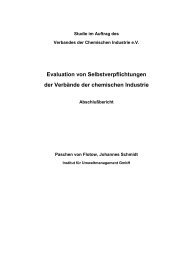Rio plus 10 - Sustainable Business Institute (SBI)
Rio plus 10 - Sustainable Business Institute (SBI)
Rio plus 10 - Sustainable Business Institute (SBI)
Sie wollen auch ein ePaper? Erhöhen Sie die Reichweite Ihrer Titel.
YUMPU macht aus Druck-PDFs automatisch weboptimierte ePaper, die Google liebt.
Dialoginitiative: Umsetzungsleitlinien für Auslandsdirektinvestitionen<br />
<strong>Business</strong> School and, through the institute, with the private sector, Government officials and<br />
Non-Governmental Organizations in Germany. We have also learned a lot from our partners<br />
in developing countries. Here, it is important to note that in practice the role that FDI is<br />
making to sustainable development of many of the poorest countries is limited on account of<br />
the fact that most FDI flows go to a relative small number of recipient countries. Thus,<br />
attracting FDI to fill technology and financing gaps remains a priority. Transparency can<br />
assist host countries in achieving the objectives of attracting FDI and promoting sustainable<br />
development in a balanced manner.<br />
Both the <strong>Rio</strong>-<strong>plus</strong>-<strong>10</strong>-Transparency Initiative as well as the above-mentioned project aim to<br />
enhance the contribution that FDI can make to sustainable development. Put simply, an FDI<br />
transaction involves a triangular relationship involving three main actors: an investor, usually<br />
a transnational corporation (TNC); the capital-importing host country and the capitalexporting<br />
home countries. The focus of the project has been on the role of TNCs from<br />
developed countries in promoting sustainable development in host developing countries.<br />
In general, there have been diverging views on the impact of TNCs on sustainable<br />
development in developing countries. On one hand, they are seen as a repository of clean<br />
technologies that facilitate sustainable development. On the other hand, TNCs have at times<br />
been accused of relocating polluting production and inferior technologies to their<br />
subsidiaries, exploiting technology gaps, not taking responsibility for their environmental<br />
impacts and sustainable development objectives. It is thus important to examine how the<br />
important potential of TNCs to contribute sustainable development in host developing<br />
countries can be explored to the fullest.<br />
The project has focused on the case studies carried out by <strong>Institute</strong> for Environmental<br />
Management and <strong>Business</strong> Administration provide interesting and useful examples of best<br />
practices. Of course, the project has a bias towards TNCs with a high level of environmental<br />
sophistication and the case studies are too few to allow for generalized conclusions.<br />
However, particularly when taken together with a survey of transborder environmental<br />
management practices of TNCs conducted under a parallel UNCTAD project, in cooperation<br />
with the Copenhagen <strong>Business</strong> School, and with financial support from the Danish<br />
International Development Agency (DANIDA), they provide some useful insights. I am sure,<br />
Mr. Paschen von Flotow will later elaborate on these.<br />
In a Seminar on "Making FDI work for sustainable development, organized by UNCTAD in<br />
November last year, there was a convergence of views that TNCs have a large, but often<br />
insufficiently explored, potential to contribute to sustainable development in host developing<br />
countries. The Seminar explored a number of ways to enhance this contribution, including<br />
through measures such as best practices, host and home country measures, and<br />
transparency through public disclosure and reporting.<br />
"Best practices" in a sense constitute a viable "soft" alternative to binding legal and<br />
administrative regimes influencing FDI flows. Best practices on transparency could promote<br />
both reporting on environmental impacts and public consultations with local stakeholders.<br />
Some argue that environmental transparency in the marketplace is capable of winning<br />
partners among companies and motivating them to improve their environmental image. It<br />
also helps allay concerns that more transparency necessarily means more regulations. An<br />
added advantage of this approach is that transparency translates into more competitive<br />
business environment. In using this information, civil society may often be more effective in<br />
maintaining a spotlight on environmental performance, for instance through awards and<br />
publicity, than more conventional regulatory approaches. This also refers to civil society in<br />
developing countries. A study on India found that the positive role that TNCs could play in<br />
conjunction with the Indian government in achieving higher environmental standards should<br />
be actively encouraged. However, local community groups and NGOs also play an important<br />
role is persuading TNCs to take greater responsibility for environmental and sustainable<br />
development impacts of their operations.<br />
24




